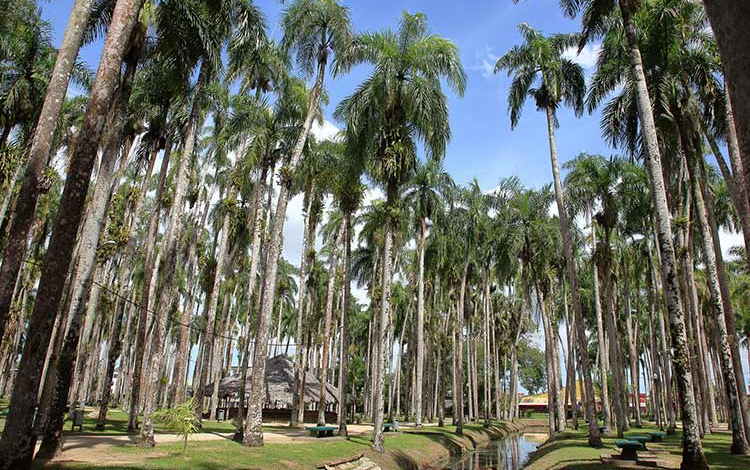The most important and best advice when traveling to Suriname

If you are planning to travel to Suriname, it is important to keep in mind the following advice:
- Safety: Exercise caution and common sense at all times, especially when moving around the country and its principal cities, as crime rates increase after dark134. Avoid wearing expensive jewelry, do not display large amounts of money in public, and avoid walking alone at night, particularly in the immediate area of hotels, restaurants, and nightclubs1.
- Transportation: Public transportation is available, but schedules are spotty, and the condition of government-run buses may not be what you are used to back home3. Avoid using public minibuses and motorcycles or scooters, as sharing the road with cars is very dangerous2. Chartered planes are generally your best bet for getting around, and dugout canoes are often the only way to reach remote villages and lodges4.
- Visa and Registration: You must apply online to obtain your tourist card or e-visa before your arrival in Suriname2. If you intend to stay in Suriname for more than three months, you must apply for an Authorization for Temporary Stay (known as an MKV) from the nearest Surinamese embassy before traveling2. After 30 days in Suriname, all foreigners are required to report within one week to the police services of the area in which they are staying2.
- Currency: The Suriname Dollar (SRD) is the official currency of the country. You can exchange US dollars for the SRD at banks in the area, at an exchange rate3.
- Dress Code: Dress modestly and avoid overt displays of wealth4.
- Health: Make sure you are up-to-date on routine vaccines before every trip. The CDC recommends that travelers get vaccinated for Hepatitis A and Typhoid1. It is also important to take precautions against mosquito-borne illnesses, such as Zika, Dengue, and Chikungunya1.
- Smart Traveler Enrollment Program (STEP): Enroll in the Smart Traveler Enrollment Program (STEP) to receive Alerts and make it easier to locate you in an emergency5.
Remember, these are general guidelines, and customs and etiquette can vary among individuals and regions. It is always a good idea to observe and follow the lead of your hosts or locals when traveling in Suriname.
- Visa and Travel Documents: Check the visa requirements for your country of residence before traveling to Suriname. Ensure that your passport is valid for at least six months beyond your planned departure date. It’s also recommended to make copies of your travel documents and keep them in a separate place in case of loss or theft.
- Health and Vaccinations: Visit a travel clinic or consult with your healthcare provider well in advance to determine the recommended vaccinations and health precautions for Suriname. Common vaccinations include those for hepatitis A and B, typhoid, yellow fever, and malaria prophylaxis, depending on the areas you plan to visit.
- Safety and Security: While Suriname is generally considered safe for travelers, it’s essential to take usual precautions to ensure your safety. Avoid displaying valuable items, be vigilant of your surroundings, and use reliable transportation options. It’s advisable to stay in well-known and reputable accommodations, especially in urban areas.
- Weather and Climate: Suriname has a tropical climate with two main seasons: the rainy season (May to August) and the dry season (September to April). Be prepared for high temperatures and humidity throughout the year. Pack lightweight, breathable clothing, sunscreen, and insect repellent. Carry a rain jacket or umbrella during the rainy season.
- Language and Communication: The official language of Suriname is Dutch, but English is widely spoken, especially in tourist areas. It’s helpful to learn a few basic phrases in Dutch or Sranan Tongo, the local creole language, to facilitate communication with locals. Having a translation app or phrasebook can also be useful.
- Currency and Money: The official currency of Suriname is the Surinamese dollar (SRD). It’s advisable to carry a mix of cash and credit/debit cards. ATMs are available in major cities, but it’s recommended to inform your bank about your travel plans to prevent any issues with accessing funds. Credit cards are widely accepted in hotels, restaurants, and larger establishments.
- Local Customs and Etiquette: Suriname is a culturally diverse country with a blend of various ethnic groups. Respecting local customs and traditions is important. Dress modestly, especially when visiting religious sites or rural areas. It’s polite to ask for permission before taking photos of people, especially those from indigenous communities.
- Transportation: Suriname has a limited public transportation system, so taxis and rental cars are the most common options for getting around. Use licensed taxis and negotiate the fare before starting your journey. If renting a car, be cautious of road conditions, especially in rural areas, and drive defensively.
- Outdoor Activities: Suriname offers beautiful natural landscapes and outdoor activities. If you plan to explore the rainforests or venture into more remote areas, consider hiring a local guide with knowledge of the terrain, wildlife, and safety precautions. Inform others of your itinerary and expected return time when going on hikes or nature excursions.
- Respect for Nature and Environment: Suriname is blessed with stunning rainforests and diverse ecosystems. Respect the environment by following responsible tourism practices. Avoid littering, stay on designated paths, and refrain from disturbing or feeding wildlife. It’s essential to practice eco-friendly behavior to preserve the natural beauty of Suriname for future generations.
Remember to check the latest travel advisories and guidelines from your government or trusted sources before your trip to stay informed about any potential updates or changes. Enjoy your journey and embrace the rich culture, biodiversity, and natural wonders that Suriname has to offer!
- Crime: Exercise caution, especially when traveling outside the capital city of Paramaribo. Avoid wearing expensive jewelry, carrying large amounts of cash, and leaving packages unattended in vehicles. Be cautious when using ATMs and driving in Suriname235.
- Road Safety: Driving in Suriname can be dangerous due to poor road conditions, inadequate lighting, and the road sense of other drivers. Drive defensively and limit travel at night3.
- Natural Disasters: Depending on the time of year, there is a low risk of experiencing natural disasters in Suriname. Stay informed about weather conditions and follow any advisories or warnings2.
- Transportation: When traveling in the interior or to remote areas, use well-established tour companies and be aware of potential risks, especially from bad weather. Sea travel has also been associated with reports of attacks against fishing boats, so remain vigilant and take suitable precautions3.
- Health: Take precautions against mosquito-borne illnesses, such as malaria, dengue, chikungunya, and Zika. Wear long sleeves, use insect repellent, and consider taking antimalarials if necessary4.
- Travel Advisories: Stay informed about travel advisories and updates from your government or embassy. Check the country information page for additional information on travel to Suriname6.
It is always recommended to stay informed, exercise common sense, and follow local laws and regulations when traveling to Suriname.

- Cultural Diversity: Suriname is known for its remarkable cultural diversity. The population consists of various ethnic groups, including Creoles, Hindustanis, Javanese, Maroons, Chinese, and indigenous peoples. This multicultural fabric is reflected in the country’s cuisine, languages, music, and religious practices, making Suriname a fascinating melting pot of cultures.
- Paramaribo: Suriname’s capital and largest city, Paramaribo, is a UNESCO World Heritage site. Its historic center features well-preserved colonial architecture, including wooden Dutch-style buildings. Stroll along Waterkant Street, visit the iconic wooden mosque and synagogue, explore the vibrant Central Market, and immerse yourself in the lively atmosphere of this cultural hub.
- Suriname River: The Suriname River is a significant waterway that runs through the heart of the country. Take a boat tour along the river to witness the lush rainforest, spot wildlife such as caimans, monkeys, and various bird species, and visit traditional villages along the riverbanks. The river also offers opportunities for fishing, river cruises, and relaxing in serene natural surroundings.
- Brownsberg Nature Park: Located approximately 80 kilometers south of Paramaribo, Brownsberg Nature Park is a popular destination for nature enthusiasts. The park is known for its breathtaking waterfalls, scenic viewpoints, and diverse wildlife. Take a guided hike through the rainforest trails, swim in refreshing natural pools, or embark on a birdwatching adventure to observe the rich avian species that inhabit the area.
- Central Suriname Nature Reserve: This vast nature reserve, inscribed as a UNESCO World Heritage site, is a pristine wilderness covering over 1.6 million hectares. It is home to rare and endangered species, including giant river otters, jaguars, and giant armadillos. Guided tours and expeditions are available for those seeking to explore the untouched rainforests, rivers, and waterfalls of this remarkable reserve.
- Galibi Nature Reserve: Located on the northeastern coast of Suriname, the Galibi Nature Reserve is renowned for its sea turtle nesting sites. Four species of sea turtles, including the endangered leatherback turtle, come ashore to lay their eggs from February to August. Visitors can witness this incredible natural spectacle and learn about turtle conservation efforts in the area.
- Surinamese Cuisine: Surinamese cuisine is a delightful fusion of flavors from various cultures. Sample dishes such as roti (Indian flatbread with curried filling), pom (baked casserole made from grated root vegetables and chicken or fish), and saoto soup (Javanese chicken soup). The vibrant food scene in Paramaribo offers a wide range of culinary experiences, from street food to upscale restaurants.
- Maroon Culture: Suriname is home to several Maroon communities, descendants of African slaves who escaped from Dutch plantations during the colonial era. These communities have preserved their unique traditions, including vibrant music, dance, and spiritual practices. Engaging with the Maroon culture provides insights into their history, customs, and way of life.
- Raleighvallen Nature Reserve: Located in the remote interior of Suriname, Raleighvallen Nature Reserve offers a pristine wilderness experience. The reserve encompasses vast rainforests, stunning waterfalls, and the renowned Voltzberg, a granite dome offering panoramic views. It’s a haven for wildlife enthusiasts, offering opportunities to spot monkeys, toucans, ocelots, and other exotic species.
- Adventure Sports: Suriname provides opportunities for thrilling outdoor activities. Explore the Suriname River by kayaking or go on a multi-day jungle trek. Adventure seekers can also try their hand at mountain biking, zip-lining through the rainforest canopy, or even embarking on an expedition to climb the 1,230-meter-high Mount Kasikasima.
These additional insights into Suriname’s cultural diversity, Paramaribo, the Suriname River, nature reserves, cuisine, Maroon culture, and adventure sports will give you a deeper understanding of the country’s unique offerings. Enjoy exploring the natural beauty, rich heritage, and warm hospitality of Suriname during your visit!
According to the sources, some common crimes that occur in Suriname are:
- Burglary, armed robbery, and violent crime occur with some frequency in Paramaribo and in outlying areas1.
- Robbery, including thefts of backpacks and purses, pickpocketing, theft of jewelry (especially necklaces), and cell phones are regular occurrences2.
- Drug trafficking: Suriname is a transit zone for South American cocaine en route to Europe, Africa, and to a lesser extent the U.S26.
- Property crimes such as vandalism and theft are moderate4.
- Violent crimes such as assault and armed robbery are also moderate4.
- Fauna-related crimes, especially jaguar poaching and trading in jaguar parts, are also a concern5.
- There have been reports of tourists and foreigners being robbed while traveling in the countryside, and occasional reports of bandits on rural roads2.
- There have been reports of attacks against fishing boats in and around the waters of Suriname2.
- Homeless people in Paramaribo have been victims of murder, with some of the killings appearing to be ritualistic2.
It is important to exercise caution and common sense at all times, especially when moving around the country and its principal cities, as crime rates increase after dark
134. Avoid wearing expensive jewelry, do not display large amounts of money in public, and avoid walking alone at night, particularly in the immediate area of hotels, restaurants, and nightclubs1.

- Jodensavanne: Jodensavanne, or “Jewish Savannah,” is a historic site located near the Suriname River. It was once a thriving Jewish community in the 17th and 18th centuries and served as a center for Jewish culture and trade. Today, visitors can explore the remnants of synagogues, cemeteries, and other structures that bear witness to Suriname’s Jewish heritage.
- Bigi Pan: Bigi Pan is a vast swampy area located in the northwest of Suriname, near the coast. It is a paradise for birdwatchers, as it is home to over 100 species of birds, including flamingos, herons, ibises, and kingfishers. Take a boat tour to observe the diverse birdlife, spot caimans basking in the sun, and immerse yourself in the tranquility of this unique wetland ecosystem.
- Commewijne Plantations: The Commewijne district, located just east of Paramaribo, is known for its historical plantations that date back to the Dutch colonial era. Many of these former sugar and coffee plantations are now open to visitors, offering a glimpse into Suriname’s plantation history. Explore the restored buildings, visit the outdoor museum at Frederiksdorp, and learn about the lives of the enslaved people who worked on these estates.
- Suriname Cuisine: Surinamese cuisine is a delightful blend of flavors and influences from various cultures. Don’t miss trying dishes such as roti (Indian flatbread with curried filling), pom (a flavorful casserole made with chicken or fish and grated root vegetables), and bakabana (fried plantains). The diverse culinary heritage of Suriname makes it a food lover’s paradise.
- Suriname River Cruises: Embark on a river cruise along the Suriname River to explore the country’s interior and experience its natural beauty. Cruise operators offer multi-day trips that take you deep into the rainforest, where you can witness wildlife, visit indigenous villages, and learn about traditional practices. These cruises provide a unique opportunity to immerse yourself in the untouched wilderness of Suriname.
- Galibi: Galibi is a small village located near the border with French Guiana. It is known for its indigenous communities, traditional crafts, and vibrant culture. Visit Galibi during the nesting season (February to August) to witness the incredible sight of sea turtles coming ashore to lay their eggs. You can also learn about indigenous traditions, participate in craft workshops, and explore the stunning coastal landscape.
- Surinamese Music and Dance: Suriname has a rich musical heritage influenced by various cultures. Traditional music genres include kaseko, which blends African rhythms with modern instruments, and kawina, which features Afro-Surinamese drumming and singing. Experience the lively rhythms and energetic dance performances during festivals or cultural events to get a taste of Suriname’s vibrant music scene.
- Avanavero Festival: The Avanavero Festival, held annually in Suriname, celebrates the culture and heritage of the indigenous peoples. It showcases traditional dances, music, crafts, and culinary delights. The festival offers a unique opportunity to connect with indigenous communities, learn about their traditions, and appreciate their contributions to Surinamese culture.
- Surinamese Art and Craft: Suriname has a thriving art scene, with talented artists creating paintings, sculptures, and crafts that reflect the country’s cultural diversity. Visit art galleries and craft markets in Paramaribo to admire and purchase unique artworks, jewelry, textiles, and wood carvings created by local artisans.
- Suriname’s Waterfalls: Suriname is blessed with several stunning waterfalls that are worth exploring. Raleigh Falls, Blanche Marie Falls, and Wonotobo Falls are among the most notable. These cascades offer breathtaking natural beauty, opportunities for swimming, and serene surroundings that are perfect for relaxation and rejuvenation.
These additional insights into Jodensavanne, Bigi Pan, Commewijne Plantations, Suriname cuisine, Suriname River cruises, Galibi, Surinamese music and dance, Avanavero Festival, Surinamese art and craft, and Suriname’s waterfalls will provide you with a deeper understanding of Suriname’s cultural, natural, and artistic offerings. Enjoy exploring the diverse facets of Suriname and creating unforgettable memories during your visit!
According to the sources, the most dangerous areas in Suriname for tourists are:
- Paramaribo: Although it is the only true city in Suriname and offers the most safety along with an array of activities, caution should still be exercised in different areas of the city, and when dealing with local tour experiences2.
- Major business and shopping districts in the capital: Pickpocketing and robbery are increasingly common in these areas, so avoid wearing expensive jewelry or displaying large amounts of money in public. Keep valuables such as your passport, tickets, driving license, and credit cards secure and keep photocopies of these documents in a separate place45.
- Remote areas: There have been reports of tourists being robbed while traveling in the countryside, and occasional reports of bandits on rural roads12.
It is important to exercise caution and common sense at all times, especially when moving around the country and its principal cities, as crime rates increase after dark
134. Avoid wearing expensive jewelry, do not display large amounts of money in public, and avoid walking alone at night, particularly in the immediate area of hotels, restaurants, and nightclubs1.



